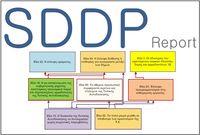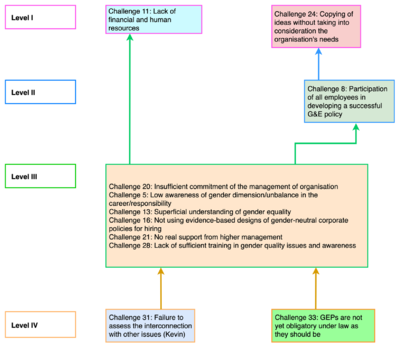R-I-Peers - Athens Virtual SDD Obstacles we face when designing and implementing GEPs: Difference between revisions
No edit summary |
No edit summary |
||
| Line 42: | Line 42: | ||
Cluster | # Cluster Commitment | ||
Cluster | # Cluster Resources | ||
Cluster | # Cluster Knowledge-Awareness | ||
Cluster | # Cluster Conflict with existing HR | ||
Cluster | # Cluster Inclusion of employees # | ||
Cluster | # Cluster Evaluation | ||
Cluster | # Cluster Not evidence-based | ||
Cluster | # Cluster Environment | ||
Cluster | # Cluster Beurocracy | ||
Cluster | # Cluster Insufficient Measures | ||
Cluster | # Cluster Research | ||
A percentage of 54% of the total number of ideas, that is 14 ideas, received at least two votes each, 12 ideas receive one vote, while the remaining 28 received no votes at all. | A percentage of 54% of the total number of ideas, that is 14 ideas, received at least two votes each, 12 ideas receive one vote, while the remaining 28 received no votes at all. | ||
Revision as of 05:34, 19 August 2022
|
Executive Summary
TThe Mutual Learning Workshop "What are the best practices to overcome problems, barriers, issues when implementing your GEPs?" was organised virtually (Due to the Covid-19 pandemic and the consequent sanctions and difficulties in traveling abroad, the consortium of the project decided to deliver the workshop virtually) over 4 sessions using Zoom on the dates shown below. The Greek partner, ISOTITA has sent the invitation 6 weeks before the event to many national, some international and all partners.
- 16/12/2021 (30 min) Preparatory for introductions and to explain the process
- 13/1/2022 (2 hrs) Collection and Clarification of contributions
- 20/1/2022 (2 hrs) Clustering
- 27/1/2022 (2 hrs) Structuring and Road Mapping
Yiannis Laouris, from the Cyprus Neuroscience & Technology Institute (CNTI) has served as the Facilitator. in the context of the project R&I PEERS funded by the European Union’s Horizon 2020 Research and Innovation Programme,
The workshop, which was realised using the participatory methodology of the Structured Democratic Dialogue (SDD), brought together fifteen (15) experts from the gender equality field representing universities, governmental and scientific bodies as well as enterprises to discuss the existing practices across Gender Equality Plans (GEPs).
Triggering Question (TQ) of the workshop
What barriers or obstacles do we face when designing and implementing GEPs?
In response to the TQ, the XX participants came up with 54 ideas, which were categorized in 4 clusters. Following the voting process, 22 ideas received one or more votes and 11 were structured to create the influence MAP shown below.
- Cluster Commitment
- Cluster Resources
- Cluster Knowledge-Awareness
- Cluster Conflict with existing HR
- Cluster Inclusion of employees #
- Cluster Evaluation
- Cluster Not evidence-based
- Cluster Environment
- Cluster Beurocracy
- Cluster Insufficient Measures
- Cluster Research
A percentage of 54% of the total number of ideas, that is 14 ideas, received at least two votes each, 12 ideas receive one vote, while the remaining 28 received no votes at all.
According to the participants of this workshop, the practices that appear to be the most influential were:

